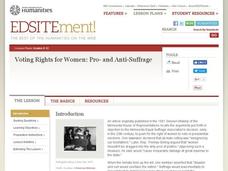DocsTeach
Analyzing a Child Labor Photograph
Sometimes images tell shocking stories. Individuals examine a Lewis Hines picture of children packing beans and consider the impact working in a factory had on their young lives. A series of prompts emailed to the teacher helps them...
DocsTeach
We Shall Overcome: March on Washington
Unlike most children, Edith Lee-Payne of Detroit went to the March on Washington with her mother to celebrate her 12th birthday. Pupils walk the march with her by analyzing a closeup image of her that has come to represent the pivotal...
American Institute of Physics
Physicist Activist: Dr. Elmer Imes and the Civil Rights Case of Juliette Derricotte
Elmer Imes was not only a brilliant physicist but also a civil rights activist. After an introductory lecture, groups read two articles about a traffic accident that killed one Fisk University student and injured several others. The...
Carolina K-12
Introduction to the Holocaust
Young historians gain a well-rounded insight into the tragedy of the Holocaust by exploring pre-war Jewish life, reading and discussing survivor testimonies, and illustrating their understanding by using their own words and those of a...
K12 Reader
Find the Meaning: JFK's Inaugural Speech
Analyze a seminal speech from the 20th century with an activity focused on President John F. Kennedy's inaugural address. After reading an excerpt from the address, pupils use a worksheet to practice their reading comprehension skills...
K20 Learn
American Exclusivity: The Chinese Exclusion Act
New ReviewThe Chinese Exclusion Act—the first race-based immigration restriction—is echoed in today's debates on the topic. Using graphic organizers and structured discussions, historians consider the reasons behind the act and compare the...
Roy Rosenzweig Center for History and New Media
Founding Documents
Teach the class about the predecessor to Declaration of Independence—the Virginia Declaration of Rights. Using the foundational documents, scholars examine the two writings to consider how they are similar and how they are different. A...
Stanford University
Battle of the Somme
The Battle of the Somme was a conflict that raged on for months. Academics view a presentation and read text excerpts from newspaper articles to understand the events that turned the battle into a long conflict. The presentation also...
Curated OER
Election of 1864
An interesting lesson plan uses a hands-on-activity and group discussion to explore the 1864 presidential election and Lincoln's plans for ending the Civil War. Designed for high school, the resource also requires historians to...
Curated OER
African Americans After the Civil War
Young historians learn what life was like in the South during the Reconstruction era. They complete hands-on-activities and participate in group discussion to understand how experiences varied between African Americans and white...
Encyclopedia Britannica
Candidate Position Research
As part of their study of the US Presidential election process, class members research a presidential candidate's position on a specific topic or topics. Formatting their research as a pro/con question ("Should the Death Penalty Be...
Teaching Tolerance
Critiquing Hate Crimes Legislation
The high school lesson plan explores what hate crimes are and how the government has responded to those crimes. Academics read legislation, analyze political cartoons, and complete hands-on-activities to understand what motivates...
Teaching Tolerance
Introducing 'The New Jim Crow'
When Jim Crow Laws ended, the intent behind them did not. Academics read "The New Jim Crow Laws" and an interview from the author to understand how racism has not ended, but rather changed over time. The lesson explains how prejudices in...
National Endowment for the Humanities
The Tyranny of the Majority
In American democracy, majority rules but what prevents the voices of the few from being crushed? Using excerpts from Alexis de Tocqueville's writings, young historians explore cases where minority rights were trampled upon. Extension...
National Endowment for the Humanities
The Omnipotence of the Majority
While the American system is based on the idea of almost-universal suffrage for adults, great thinkers have had concerns about this system of governance. Using classic writings from Alexis de Tocqueville and videos highlighting thinkers...
National Endowment for the Humanities
Analyzing “Intercepted Intelligence”
A good diplomat needs to know how world events can affect their country. First, class members examine the Papal Bull that excommunicated Queen Elizabeth I from the Roman Catholic Church. Then, learners playing the role of diplomat from...
DocsTeach
Election of 1800
The 2020 election is not the only unpredictable one in history. The Election of 1800 highlighted an unforeseen event in a presidential election. The activity reviews documents from the elections and what happened when the electoral...
National Park Service
Lesson 1: Journaling with Songs of Freedom
There's more to music than a memorable tune. The songs of those who were enslaved reveal the harsh realities of their lives. Using both songs and slave narratives, historians uncover this hidden history. The lesson incorporates a variety...
National Park Service
Lesson 3: Resistance
During the time of slavery, resistance was a way of life for the men and women held in bondage. Using music as evidence of their fight against oppression, learners explore how enslaved people fought back. Writing prompts round out the...
National Park Service
Lesson 4: Escape
Some enslaved people decided to run for their liberation. Using lyrics of songs they sang, young historians look at these anthems of freedom. An assessment asks them to write the story of escape from the perspective of an enslaved person.
Center for History Education
Pontiac's War
Invaders are coming: fight them off or run? Native American peoples had to decide this question after British colonists went west following the French and Indian War. Using a speech from Chief Pontiac, young historians consider if they...
Alabama Department of Archives and History
How Two Alabamians Remembered Slavery Years Later
Designed to help readers recognize the point of view of the author of a primary source documents and analyze how that point of view influences the reliability of a text, young historians examine two personal letters, one written by...
Curated OER
Voting Rights for Women: Pro- and Anti-Suffrage
Students examine the arguments for and against suffrage for women in the 19th and early 20th centuries. They explore various websites, read and discuss primary source documents, develop a document from two points of view, and analyze...
Alabama Department of Archives and History
What Were They Thinking? Why Some Some Alabamians Opposed the 19th Amendment
To better understand the debate over the 19th Amendment, class members examine two primary source documents that reveal some of the social, economic, racial, and political realities of the time period.

























